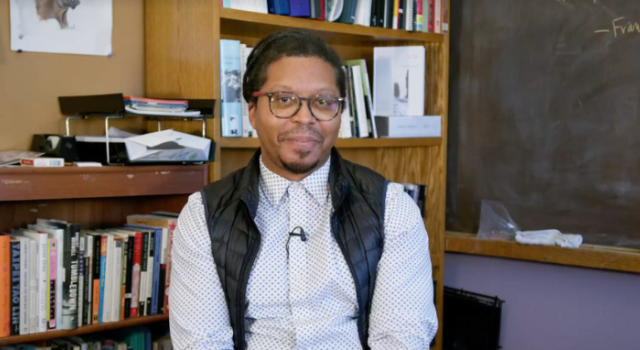
Nathan McClain

Nathan McClain, assistant professor of creative writing and African American literary arts, received an M.F.A. in creative writing from Warren Wilson's M.F.A. program for writers.
He is the author of Scale (Four Way Books, 2017), a recipient of fellowships from the Sewanee Writers' Conference, The Frost Place, and the Bread Loaf Writers' Conference. Previously, he taught creative writing at Seton Hall, Drew University, and St. Joseph's College, as well as poetry workshops for the Cave Canem Foundation.
His poems and prose have recently appeared or are forthcoming in New York Times Magazine, upstreet, American Poets, The Rumpus, and Hunger Mountain, among others.
Recent and Upcoming Courses
-
Increasingly, it would seem to be the preference of readers in our neo-narrative age-age of biography and memoir, age of the talk show, the podcast, and TTRPG actual play-an appetite for story. Or narrative. Which also applies to poetry. Though, the lyric poet might just as easily argue that every narrative poem obscures a lyric, which itself slows or suspends time. What occurs when a poem is more concerned with "how something felt" than "what happened"? What use is the lyric in poetry? In this course, participants will investigate such questions-we'll consider the lyric poem more generally, and we'll acquire and develop the craft and technique that builds such poems. Participants will have the opportunity to workshop their own poems as well as the poems of their peers. Students may read work by Charles Wright, Donald Justice, Donika Kelly, Sandra Beasley, and Emily Dickinson, among others. Keywords:creative writing, poetry, lyric, workshop
-
The late poet and essayist, Reginald Shepherd, in his thought-provoking essay, "The Other's Other," writes "I am just as much a black person when I write about spring snow and narcissus blooms as when I write about the South Bronx or the slave trade, and I am as much not." Poet, essayist, and editor, Camille Dungy, adds, "To bring more voices into the conversation about human interactions with the natural world, we must change the parameters of the conversation." For centuries, our writing about the living world has been defined by Anglo-American perspectives, though Black and brown poets and writers have offered unique perspectives on American social and literary history to broaden our concept of ecocriticism and ecopoetics. In this course, students will consider and examine the literature of nature from the lens of these poets and writers as well as explore their own unique relationships to the living, natural world through original poetry, fiction, creative non-fiction, and hybrid forms. Students may read and consider the work of Aimee Nezhukumatahil, Jericho Brown, Lucille Clifton, Jennifer Chang, and Ed Roberson, among others Keywords:creative writing, nature writing, ecopoetics, ecocriticism, environmental justice
-
There are many "rules" that accompany the writing of poetry-among them, the practice of the poet deploying an "economy of language," or revising one's work to eliminate redundancy, cliche, or weak diction. Economy of language has its place in drafting and revising poetry but isn't the only evidence of a knowledge of craft. Craft can also be displayed in the long poem, which this workshop will consider the long poem. How does the writer sustain the poem's focus, momentum, and direction? How does the writer emphasize "intent" given the expansiveness of the poem? How does the writer negotiate the possibility of excess? More importantly, how does the long poem sustain the reader's attention and engagement? Why go on and on? What's the payoff? Students may consider the work of Rachel Zucker, Ross Gay, Tommy Pico, John Murillo, and Brigit Pegeen Kelly, among others. As workshop courses often fill quickly and have lengthy waitlists, students must attend the first workshop session to secure class enrollment. Keywords:Poetry, workshop, revision, long
-
It was in the midst of grieving the loss of her most beloved fish, Telly, that poet Toi Derricotte wrote, "Joy is an act of resistance." Poet Lucille Clifton closes her oft-anthologized "won't you celebrate with me" with "come celebrate / with me that everyday / something has tried to kill me / and has failed." Both poets understand that we only know joy within the context of sorrow, but they choose to center their joy rather than be present only for Black pain or death. Black people's everyday commitment to locating joy in our lives can often pierce through challenging times and help us think differently about struggle. How might Black joy also be embraced as a philosophy, a poetics of being? Our course will explore that very question. Students should expect to explore and document joy through drafting poems, essayettes, and taking and curating photographs or photo essays. Students should expect to engage with work by Kleavor Cruz, Ross Gay, Zadie Smith, and Mahogany L. Browne, among others Keywords:Joy, poetry, Blackness, delights, Joy, poetry, Blackness, delights, The content of this course deals with issues of race and power. This course could be used to fulfill the Division II Project requirement



